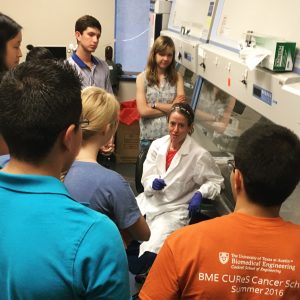Cancer is a disease of complexity.
Engineering principles are developed to study, model, and solve complex problems.
Biomedical Engineering is uniquely poised to make a significant intellectual contribution to solving this complex problem.
BME CUReS Cancer Scholars address nationally identified key challenges in cancer research using an engineering approach.
Read more about the Key Challenges in Cancer Research
Typical Program
End of May through Beginning of August
We hope to resume the program in the summer of 2024.
Structured Mentoring

Each Scholar will have both a faculty mentor and a graduate-student mentor (GSM), a mentoring system that has proven effective. The faculty mentors chosen for this project are professors who routinely mentor undergraduates in their labs and have a strong record of supporting undergraduate publication. These faculty mentors will likewise choose GSMs who are enthusiastic about mentoring undergraduates and have undergone mentor training.
Seminars
Ten weekly online 90-minute CUReS Cancer Seminars will address professional development and exploration of BME careers. Seminars will include invited guests, including professors, BME alumni, local industry professionals, and graduate students. Some of the Seminars will include local UT Austin students, and some will be for Scholars only.
Topics will include:
- applying to graduate school
- social impacts of research
- research ethics
- ethics of reporting on research
- balancing research and family
- practical skills for presenting research, and interpersonal communication
- reflective activities on research experiences, learning processes, and personal career goals
Presentations at BMES Annual Meeting
In addition to presenting their summer  accomplishments in a university-wide online summer research poster session in August, a real-world capstone experience will be especially useful to the Scholars as a way to authentically experience the “culture of research”. For this purpose, each Scholar will prepare and submit an abstract for the undergraduate research poster session of the annual meeting of the Biomedical Engineering Society (BMES).
accomplishments in a university-wide online summer research poster session in August, a real-world capstone experience will be especially useful to the Scholars as a way to authentically experience the “culture of research”. For this purpose, each Scholar will prepare and submit an abstract for the undergraduate research poster session of the annual meeting of the Biomedical Engineering Society (BMES).
Travel funds are available to the Scholars whose abstracts are accepted to enable them to present their posters at the BMES Annual Meeting. The faculty and graduate student mentors who also attend the BMES annual meeting will organize a reunion party with the Scholars in conjunction with an annual BMES reception hosted by the Department of Biomedical Engineering.


